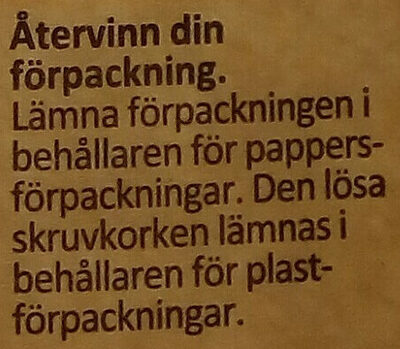Help us make food transparency the norm!
As a non-profit organization, we depend on your donations to continue informing consumers around the world about what they eat.
The food revolution starts with you!
Arla Ko Ekologisk Minimjölk - 1 l
Arla Ko Ekologisk Minimjölk - 1 l
Streckkod: 7310865087713 (EAN / EAN-13)
Vanligt namn: 1 liter ekologisk minimjölk, <0,1% fett
Kvantitet: 1 l
Förpackning: Plast, en:container
Varumärken: Arla Ko, Arla, Arla Foods
Kategorier: Mejeriprodukt, Mjölk, Pastöriserad mjölk, Komjölk
Etiketter, certifieringar, utmärkelser:
Ekologisk, EU-ekologisk, en:FSC, en:FSC Mix, ISO 14067, Keyhole, SE-EKO-01, KRAV, FSC-C081801, Svensk mjölk



Ingredients ursprung: Sverige
Tillverknings eller bearbetningsplats: Sverige
Spårbarhetskod: SE 1028 EC, SE 1029 EC
Länk till produktsidan på producentens officiella webbplats: https://www.arla.se/produkter/arla-ko-ek...
Butiker: ICA Supermarket, Willys, Coop Konsum
Länder där såld: Sverige
Matching with your preferences
Hälsa
Ingredienser
-
2 ingredienser
Mjölk, vitamin D.Allergener: Mjölk
Food processing
-
Obearbetade eller minimalt bearbetade livsmedel
Food products are classified into 4 groups according to their degree of processing:
- Obearbetade eller minimalt bearbetade livsmedel
- Bearbetade kulinariska ingredienser
- Halvfabrikat
- Ultra processed foods
The determination of the group is based on the category of the product and on the ingredients it contains.
Ingrediensanalys
-
Palmoljefri
No ingredients containing palm oil detected
-
Icke-vegan
Non-vegan ingredients: Mjölk
-
Vegetarisk status okänd
Okända ingredienser: Vitamin D
-
Details of the analysis of the ingredients
: Mjölk, vitamin D- Mjölk -> en:milk - vegan: no - vegetarian: yes - ciqual_proxy_food_code: 19051 - percent_min: 50 - percent_max: 100
- vitamin D -> en:vitamin-d - percent_min: 0 - percent_max: 50
Näring
-
Very good nutritional quality
⚠ ️Varning: mängden fibrer är inte angiven, eventuella positiv inverkan på betyget kunde inte beaktas.⚠ ️Warning: the amount of fruits, vegetables and nuts is not specified on the label, it was estimated from the list of ingredients: 0This product is not considered a beverage for the calculation of the Nutri-Score.
Positiva poäng: 2
- Proteiner: 2 / 5 (värde: 3.5, avrundat värde: 3.5)
- Fiber: 0 / 5 (värde: 0, avrundat värde: 0)
- Frukt, grönsaker, nötter och raps- / valnöt- / olivoljor: 0 / 5 (värde: 0, avrundat värde: 0)
Negativa poäng: 1
- Energi: 0 / 10 (värde: 150, avrundat värde: 150)
- Socker: 1 / 10 (värde: 4.9, avrundat värde: 4.9)
- Mättat fett: 0 / 10 (värde: 0, avrundat värde: 0)
- Natrium: 0 / 10 (värde: 40, avrundat värde: 40)
The points for proteins are counted because the negative points are less than 11.
Näringsvärde: (1 - 2)
Nutri-Score:
-
Näringsvärden
-
Fett i låg kvantitet (0.1%)
What you need to know- A high consumption of fat, especially saturated fats, can raise cholesterol, which increases the risk of heart diseases.
Recommendation: Limit the consumption of fat and saturated fat- Choose products with lower fat and saturated fat content.
-
Mättat fett i låg kvantitet (0%)
What you need to know- A high consumption of fat, especially saturated fats, can raise cholesterol, which increases the risk of heart diseases.
Recommendation: Limit the consumption of fat and saturated fat- Choose products with lower fat and saturated fat content.
-
Sockerarter i låg kvantitet (4.9%)
What you need to know- A high consumption of sugar can cause weight gain and tooth decay. It also augments the risk of type 2 diabetes and cardio-vascular diseases.
Recommendation: Limit the consumption of sugar and sugary drinks- Sugary drinks (such as sodas, fruit beverages, and fruit juices and nectars) should be limited as much as possible (no more than 1 glass a day).
- Choose products with lower sugar content and reduce the consumption of products with added sugars.
-
Salt i låg kvantitet (0.1%)
What you need to know- A high consumption of salt (or sodium) can cause raised blood pressure, which can increase the risk of heart disease and stroke.
- Many people who have high blood pressure do not know it, as there are often no symptoms.
- Most people consume too much salt (on average 9 to 12 grams per day), around twice the recommended maximum level of intake.
Recommendation: Limit the consumption of salt and salted food- Reduce the quantity of salt used when cooking, and don't salt again at the table.
- Limit the consumption of salty snacks and choose products with lower salt content.
-
-
Näringsfakta
Näringsfakta Som såld
för 100 g / 100 mlCompared to: Komjölk Energi 150 kj
(35 kcal)−27 % Fett < 0,1 g −95 % Mättat fett 0 g −100 % Kolhydrat 4,9 g +9 % Sockerarter 4,9 g +9 % Fiber ? Protein 3,5 g +1 % Salt 0,1 g - Vitamin D 1 µg - Vitamin B5 (Pantotensyra) 0,5 mg +7 % Kalium 160 mg +1 % Klorid 95 mg +1 % Kalcium 120 mg - Fosfor 105 mg +1 % Molybden 4,7 µg −0 % Jod 12 µg −2 % Fruits‚ vegetables‚ nuts and rapeseed‚ walnut and olive oils (estimate from ingredients list analysis) 0 % Vitamin B2 (Riboflavin) 0,15 mg Vitamin B9 (Folic acid) 15 µg Vitamin B12 (cobalamin) 0,6 µg
Miljö
-
Eco-Score B - Låg miljöpåverkan
The Eco-Score is an experimental score that summarizes the environmental impacts of food products.→ The Eco-Score was initially developped for France and it is being extended to other European countries. The Eco-Score formula is subject to change as it is regularly improved to make it more precise and better suited to each country.Life cycle analysis
-
Average impact of products of the same category: C (Score: 56/100)
Kategori: Milk, semi-skimmed, UHT
Kategori: Milk, semi-skimmed, UHT
- PEF environmental score: 0.12 (the lower the score, the lower the impact)
- including impact on climate change: 1.32 kg CO2 eq/kg of product
Stage Impact Jordbruk
71.1 %Bearbetar
1.2 %Förpackning
11.5 %Transportation
12.6 %Distribution
3.7 %Consumption
0.0 %
Bonuses and maluses
-
Labels with high environmental benefits
Bonus: +15
-
EU-ekologisk
Ekologiskt jordbruk bidrar till att bevara biologisk mångfald, klimat, vattenkvalitet och markfruktbarhet.
Ekologisk mat är mat som produceras enligt ekologiskt jordbruk och har metoder som främjar resurshantering, ekologisk balans och bevarande av biologisk mångfald.
-
-
Origins of ingredients with a low impact
Bonus: +19
Environmental policy: +4
Transportation: +15
Origin of the product and/or its ingredients % of ingredients Impact Sverige 100 %Låg
-
Packaging with a medium impact
Malus: -10
Form Material Återvinning Impact Okänd Plast Hög ⚠ ️ The information about the packaging of this product is not sufficiently precise (exact shapes and materials of all components of the packaging).⚠ ️ For a more precise calculation of the Eco-Score, you can modify the product page and add them.
If you are the manufacturer of this product, you can send us the information with our free platform for producers.
Eco-Score for this product
-
Impact for this product: B (Score: 79/100)
Produkt: Arla Ko Ekologisk Minimjölk - 1 l
Life cycle analysis score: 56
Sum of bonuses and maluses: +24
Final score: 79/100 (The score of products with non-recyclable and non-biodegradable packaging materials is capped at 79 (grade B).)
-
Carbon footprint
-
Equal to driving 0.7 km in a petrol car
132 g CO² per 100g of product
The carbon emission figure comes from ADEME's Agribalyse database, for the category: Milk, semi-skimmed, UHT (Source: ADEME Agribalyse Database)
Stage Impact Jordbruk
71.4 %Bearbetar
0.9 %Förpackning
11.2 %Transportation
15.3 %Distribution
1.2 %Consumption
0.0 %
Förpackning
-
Packaging with a medium impact
-
Packaging parts
Okänd (Plast)
-
Packaging materials
Material % Packaging weight Packaging weight per 100 g of product Plast
-
Transportation
-
Origins of ingredients
Origins of ingredients with a low impact
Origin of the product and/or its ingredients % of ingredients Impact Sverige 100 %Låg
Etiketter
-
EU-ekologisk
Ekologiskt jordbruk bidrar till att bevara biologisk mångfald, klimat, vattenkvalitet och markfruktbarhet.
Ekologisk mat är mat som produceras enligt ekologiskt jordbruk och har metoder som främjar resurshantering, ekologisk balans och bevarande av biologisk mångfald.
Report a problem
-
Incomplete or incorrect information?
Category, labels, ingredients, allergens, nutritional information, photos etc.
If the information does not match the information on the packaging, please complete or correct it. Open Food Facts is a collaborative database, and every contribution is useful for all.
Datakällor
Produkt tillagd den av olofolleola4
Senast ändrad produktsida på av packbot.
Produktsida också redigerad av openfoodfacts-contributors, roboto-app.












